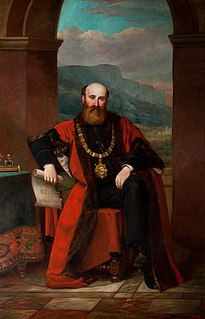
The Ulster Unionist Party (UUP) is a unionist political party in Northern Ireland. Having gathered support in Northern Ireland during the late-nineteenth and early-twentieth centuries, the party governed Northern Ireland between 1921 and 1972. It was supported by most unionist voters throughout the conflict known as the Troubles, during which time it was often referred to as the Official Unionist Party (OUP). Between 1905 and 1972 its MPs took the Conservative whip at Westminster, considered as part of the Conservative Party.

Unionism in Ireland is a political ideology that favours the continuation of some form of political union between the islands of Ireland and Great Britain. Since the partition of Ireland, unionism in Ireland has focused on maintaining and preserving the place of Northern Ireland within the United Kingdom. In this context, a distinction may be made between the unionism in the province of Ulster and unionism elsewhere in Ireland.
The Unionist Party was the main centre-right political party in Scotland between 1912 and 1965.
The Ulster Popular Unionist Party (UPUP) was a unionist political party in Northern Ireland. It was founded in 1980 by James Kilfedder, independent Unionist Member of Parliament for North Down, who led the party until his death in 1995.
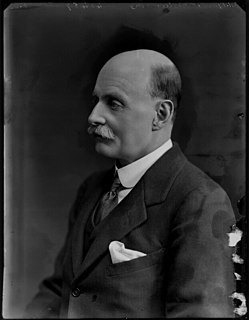
Walter Hume Long, 1st Viscount Long,, was a British Unionist politician. In a political career spanning over 40 years, he held office as President of the Board of Agriculture, President of the Local Government Board, Chief Secretary for Ireland, Secretary of State for the Colonies and First Lord of the Admiralty. He is also remembered for his links with Irish Unionism, and served as Leader of the Irish Unionist Party in the House of Commons from 1906 to 1910.
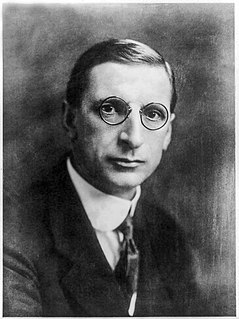
Two elections in Ireland took place in 1921, as a result of the Government of Ireland Act 1920 to establish the House of Commons of Northern Ireland and the House of Commons of Southern Ireland. The election was used by Irish Republicans as the basis of membership of the Second Dáil. Where contested, the elections used single transferable vote.
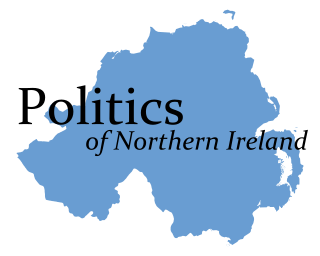
Elections in Northern Ireland are held on a regular basis to local councils, the Northern Ireland Assembly, the Parliament of the United Kingdom, and to the European Parliament.
The Irish Unionist Alliance (IUA), also known as the Irish Unionist Party or simply the Unionists, was a unionist political party founded in Ireland in 1891 from the Irish Loyal and Patriotic Union to oppose plans for home rule for Ireland within the United Kingdom of Great Britain and Ireland. The party was led for much of its existence by Colonel Edward James Saunderson and later by William St John Brodrick, Earl of Midleton. In total, eighty-six members of the House of Lords affiliated themselves with the Irish Unionist Alliance, although its broader membership was relatively small.

Reginald Norman Morgan Empey, Baron Empey, OBE, best known as Reg Empey, is a British politician who was the leader of the Ulster Unionist Party from 2005 to 2010, and has been its chairman since 2012. Empey was also twice Lord Mayor of Belfast and was a Member of the Legislative Assembly for East Belfast from 1998 to 2011.
Sir Denis Stanislaus Henry, 1st Baronet, was an Irish lawyer and politician who became the first Lord Chief Justice of Northern Ireland.

Lisnaskea was a constituency of the Parliament of Northern Ireland.
Sir George Anthony Clark, 3rd Baronet, DL was an Orangeman and unionist politician in Northern Ireland.
The Buteshire by-election, 1905 was a by-election held on 3 March 1905 for the British House of Commons constituency of Buteshire.
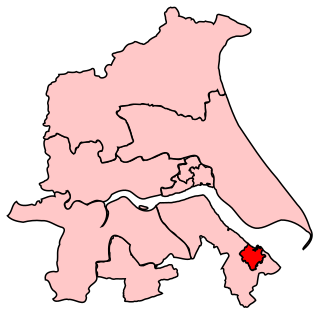
The Great Grimsby by-election was a Parliamentary by-election. It returned one Member of Parliament to the House of Commons of the United Kingdom, elected by the first past the post voting system. It was one of the last by-election contests to take place before the outbreak of war, and provided a good indicator of how the main parties would have performed at an anticipated 1914/15 general election.
The Chorley by-election was a Parliamentary by-election. It returned one Member of Parliament to the House of Commons of the United Kingdom, elected by the first past the post voting system. Although it was a safe Unionist seat which was held, the reduction in the Unionist majority was notable.
The Whitby by-election was a Parliamentary by-election. It returned one Member of Parliament to the House of Commons of the United Kingdom, elected by the first past the post voting system.
The 1905 West Down by-election was held on 2 June 1905 after the incumbent Irish Unionist Arthur Hill resigned. It was retained by the Unionist candidate Harry Liddell.

